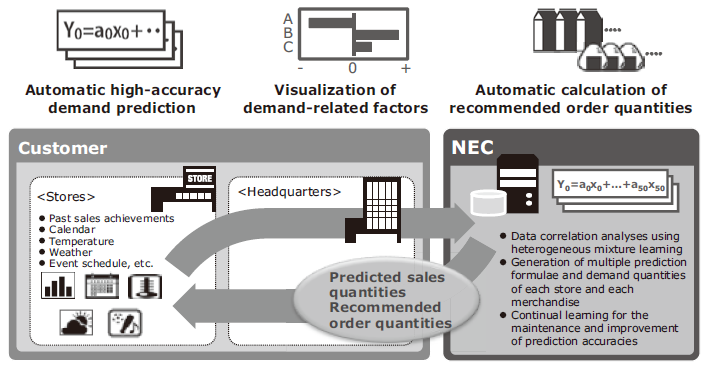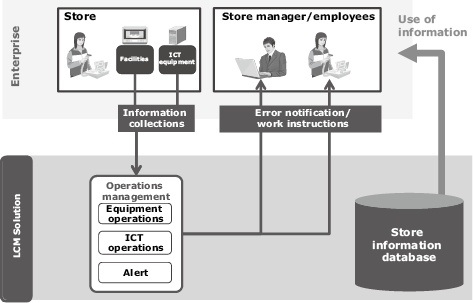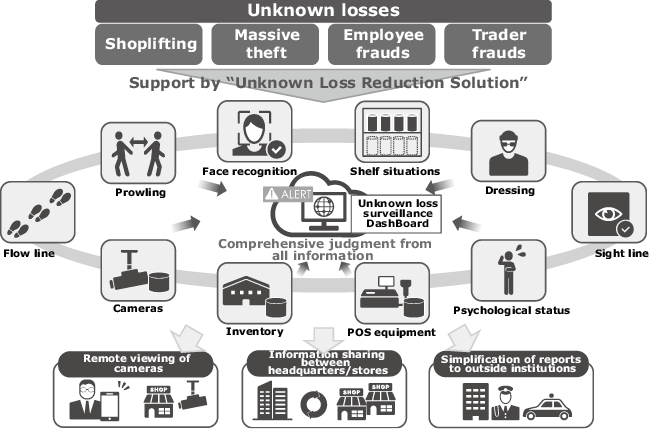Global Site
Displaying present location in the site.
IoT and AI Innovations for the Retail Industry
The retail industry is facing a need for innovative solutions because it has to deal with the diversification of consumer lifestyles and labor shortages that are due to low birthrates and population aging. The global environmental issues that are inherent in the products offered are also of concern.
NEC is making full use of its IoT and AI technologies in pursuit of good customer experience and in uninterrupted store operation by implementing improved convenience shopping, hospitality in customer services that matches the needs of individual customers, efficiency improvements and saving in the numbers of employees and store operations. It thereby supports shop management methods that can sustain a stable supply of merchandise and services.
1.Environment Surrounding the Retail Industry
The advancement of technologies has diversified the lifestyles of consumers, bringing big changes in purchasing behavior of customers. On the other hand, the ongoing decrease in the birthrate and increase in population aging has imposed a labor shortage, as one of the key issues that currently occupies store management.
It has been said that twice the currently available energy supply will be required to maintain our lifestyles worldwide by the year 2050. It is expected that coordination of the balance between supply and demand will be then required more than ever. In particular, it has become a critical problem that 1/3rd of the foodstuffs produced worldwide are wasted even though the demand for food is growing rapidly. France has enacted a law forbidding the disposal of unsold foods as waste by major supermarkets. It is not only with regard to food but it is essential also to utilize our other limited resources more efficiently.
2.Orientation of the Retail Industry
The retail industry is required to meet the diversification of lifestyles and changes in purchasing behavior of customers. In addition, it has also become necessary to make every effort to achieve the sustainable growth of enterprises by stressing the need for symbiosis with earth environments by reducing resource consumption and environmental loads while simultaneously providing a worthwhile working environment for labor.
NEC also believes that it is essential to provide mechanisms that can implement “Customer Experience” improvements including the “convenience” of buying smoothly what is needed at any time and “hospitality” in matching the needs of individual customers, the “Operational Excellence” that enables efficiency improvements and savings in the numbers of employees and store operations, and the “Lifecycle Management” that supports uninterrupted store operations (Fig. 1).

3.Innovations of the Retail Industry via IoT and AI
The retail industry is required to identify consumer needs, product sales and store conditions, analyze the optimum actions to be taken and to enforce them in an instant. For this purpose, active use of new ICT, especially the IoT and AI, is indispensable. Below we describes how the use of IoT and AI will change the operation of the retail industry and help in solving current issues.
3.1 Shopping Experience Making Use of Biometrics and Image Recognition Technologies
Authentication of customers via face recognition and identification of merchandise using image recognition technology can serve to improve customer convenience and implement shop hospitality toward them.
Face recognition using the cameras installed in shops detects the visit of each customer so that shop staff can provide specific services for each individual customer based on the information history of his/her website purchases or store visits.
As for the payment, the customer’s waiting time can be reduced by instant identification of merchandise images instead of by reading barcodes. Furthermore, thanks to face recognition, the customer can purchase goods smoothly and settle without actual payment of currency on the spot but during natural conversation with the shop staff.
The use of biometrics and image recognition technology can add convenience and hospitality to customer services.
3.2 Order Placement Support Using AI Technologies
The “heterogeneous mixture learning” is one of the AI technologies that is employed for automatically discovering several regularities from a variety of data. It supports the prevention of stock-outs of daily-delivered foodstuffs such as milk or tofu and thereby enables improvements in order placement efficiency.
Many order placement operations are dependent on the experience of individual employees. For daily food supply, systematic demand prediction has been difficult because the order quantities must be determined based on several kinds of information, including the weather, event schedules and campaign plans.
The use of AI can improve order placement efficiency based on advanced demand predictions by combining the data affecting sales, such as the part that sales achieves, weather, other meteorological conditions and event schedules. At NEC, we are capable of highly accurate demand prediction by using our unique “heterogeneous mixture learning.” In addition, we are also capable of supporting optimum order placements via automatic quantification of order calculations based on the predicted demand quantities, store stock information and delivery schedules. It not only advances and improves the efficiency of order placement operations but it can also reduce the wastage rates, thereby contributing to the solution of the food wastage issue that has become a significant social problem (Fig. 2).

3.3 Operations Support by Image Recognition and Robotics
Labor shortages in retail stores are annoying, but image recognition technology and robotics can contribute to a reduction in the work load of employees as well as in costs.
The system detects stock-out merchandise and shelf locations from the shop images and lets robots automatically transfer any lacking merchandise to the required shelves. The clerks have merely to place the transferred merchandise on the shelves so that they are freed from the exhausting task of merchandise transportation.
Cooperation with the robot serves not only for efficiency improvement and labor saving of operations but can also lead to reductions in the number of lost sales opportunities by avoiding delays in noticing stock-out incidents.
3.4 Operations Support Making Use of AR (Augmented Reality) and AI
Store operations are diversified correspondingly as store services increase. While the employment of foreign workers is also increasing, the AR and AI technologies can serve operations support by solving various problems in the store.
In a case where a store equipment item such as a coffee maker or refrigerator fails or an employee does not know how to operate it, it has previously been necessary to phone the call center to check what to do or to arrange for maintenance personnel to visit the store. When AI is used, it responds automatically to the question and offers a solution. In addition, when AR is also used, simply holding the smartphone camera above the equipment displays the guidance image overlapped onto the equipment image in order to show the points to be operated in an easy-to-understand manner. So the employee may then fix or operate the equipment without referring to the relevant manual. Even when the work load per person increases and employees are diversified, the operations supporting the use of AR and AI are sure to improve efficiency.
3.5 Store Equipment Management with Sensor Technology
The IoT can implement uninterrupted store management by real-time management of equipment operation situations.
Real-time equipment operation situation management enables repair and replacement when an irregularity is detected, even before an actual failure occurs.
Additionally, it is possible to optimize operations by identifying the status of each store based on the experience and expertise accumulated through long term partnerships with many retail businesses. For example, for a coffee maker installed in a convenience stores, etc., the usage count of the filters can be sensed by means of IoT and the optimum filter replacement timing can be analyzed/indicated by predicting the customer visit peaks.
Such management procedures not only support sustainable store management but can also improve store management efficiency by the integrated management of a wide range of equipment in each store (Fig. 3).

3.6 Loss Reduction by Image Analysis
The use of image analysis technology enables the integrated management of various pieces of information, including the images from in-store surveillance cameras and gives overall support for reductions of in-store losses.
The in-store monitoring cameras detect changes in the merchandise shelves and can therefore identify a massive theft in an instant. For the prevention of unknown losses that are one of the important factors that put pressure on retail industry profits, image analysis gives good support by enabling instant countermeasures based on real-time detection and of recurrence prevention based on image data analysis.
In addition to supporting loss reductions, image analysis also serves for the implementation of secure, safe store management (Fig. 4).

4.Conclusion
IoT for the real-time identification of store conditions and AI for analyzing optimum supportive measures based on observed conditions are now considered to be indispensable and are currently being employed by many retail industry enterprises.
We believe that ICT can contribute to the provision of convenience and hospitality for customers and to thereby implement improved and sustainable store management.
NEC is tackling the R&D of IoT and AI-based solutions by making use of our long term experience and achievements in the retail industry and we will continue to support retail business innovations via the introduction of new shopping experiences and innovative store management procedures.
Authors’ Profiles
OGAWA Kazuyuki
Senior Manager
Marketing and New Business Creation Division
KOIKE Yuichi
Deputy General Manager
1st Retail Solutions Division
SHIONOIRI Masahiro
Manager
Marketing and New Business Creation Division
NOTOMI Narumitsu
Senior Manager
1st Retail Solutions Division
FUJII Maiko
Assistant Manager
Marketing and New Business Creation Division
